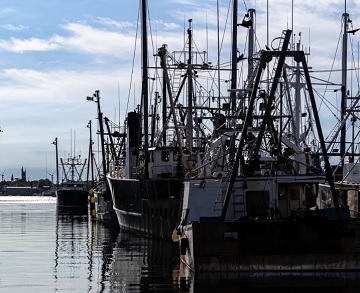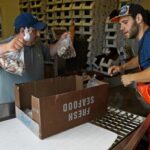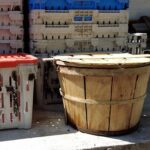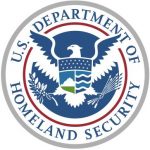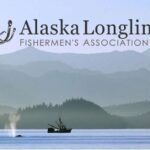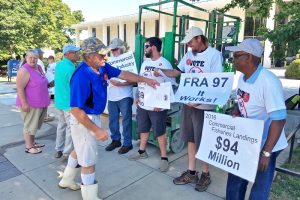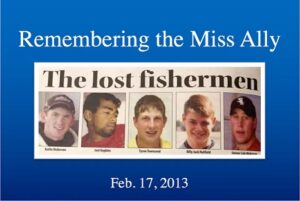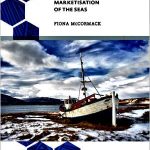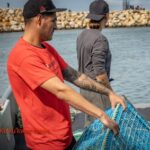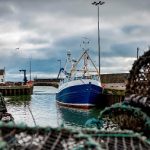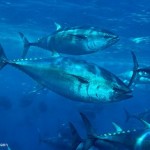Tag Archives: Responsible Offshore Development Alliance
Fishing industry asks Supreme Court to hear case against Vineyard Wind
 A national fishing industry group and conservation think tank have petitioned the U.S. Supreme Court to take up their lawsuits challenging the approval of the Vineyard Wind project, which has been under construction since 2023. The lobbying group, Responsible Offshore Development Alliance (RODA), sued the lead government regulator of offshore wind in early 2022, alleging the agency violated several acts, including those to protect existing ocean users and endangered species. At the crux of RODA’s appeal to the Supreme Court is the language of the Outer Continental Shelf Lands Act, and particularly, how the federal government interpreted it. more, >>CLICK TO READ<< 06:52
A national fishing industry group and conservation think tank have petitioned the U.S. Supreme Court to take up their lawsuits challenging the approval of the Vineyard Wind project, which has been under construction since 2023. The lobbying group, Responsible Offshore Development Alliance (RODA), sued the lead government regulator of offshore wind in early 2022, alleging the agency violated several acts, including those to protect existing ocean users and endangered species. At the crux of RODA’s appeal to the Supreme Court is the language of the Outer Continental Shelf Lands Act, and particularly, how the federal government interpreted it. more, >>CLICK TO READ<< 06:52
Vineyard Wind Withstands Another Legal Challenge
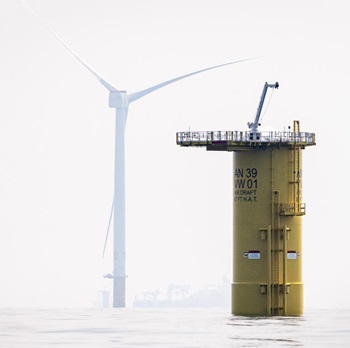 Another attempt to halt Vineyard Wind through the courts fell short last week when a federal court dismissed an appeal by a fishermen’s organization and a Rhode Island seafood dealer. A panel of judges with the U.S. First Circuit Court of Appeals upheld a lower court’s decision on Dec. 5, saying the group’s claims that the federal government mishandled the approval process for the wind farm were unfounded. The decision is one of several that Vineyard Wind, which aims to build 62 turbines to the south of the Island, has weathered in recent years, keeping the project’s approvals from the Bureau of Ocean Energy Management intact. Seafreeze Shoreside, a Rhode Island-based seafood dealer, the Long Island Commercial Fishing Association, the Responsible Offshore Development Alliance and other groups filed the appeal after their claims were rejected by the U.S. District Court in Boston in 2023. more, >>CLICK TO READ<< 12:47
Another attempt to halt Vineyard Wind through the courts fell short last week when a federal court dismissed an appeal by a fishermen’s organization and a Rhode Island seafood dealer. A panel of judges with the U.S. First Circuit Court of Appeals upheld a lower court’s decision on Dec. 5, saying the group’s claims that the federal government mishandled the approval process for the wind farm were unfounded. The decision is one of several that Vineyard Wind, which aims to build 62 turbines to the south of the Island, has weathered in recent years, keeping the project’s approvals from the Bureau of Ocean Energy Management intact. Seafreeze Shoreside, a Rhode Island-based seafood dealer, the Long Island Commercial Fishing Association, the Responsible Offshore Development Alliance and other groups filed the appeal after their claims were rejected by the U.S. District Court in Boston in 2023. more, >>CLICK TO READ<< 12:47
Vineyard Wind crisis: Fishermen blast feds for saying they don’t care about whales
 The claim came during a Thursday hearing in Boston federal appeals court as two fishing groups look to toss Vineyard Wind’s underlying permit, arguing regulators failed to analyze how the project would impact the environment and fishermen. “The alliance, as a trade association representing the fishing industry, does not have any interest in protecting right whales,” said attorney Thekla Hansen-Young, representing the Department of the Interior, the National Marine Fisheries Service, among other federal agencies, in the dispute. Hansen-Young was referring to the Responsible Offshore Development Alliance, one of the groups fighting the feds and Vineyard Wind. Seafreeze Shoreside Inc. is the other. more, >>CLICK TO READ<< 13:06
The claim came during a Thursday hearing in Boston federal appeals court as two fishing groups look to toss Vineyard Wind’s underlying permit, arguing regulators failed to analyze how the project would impact the environment and fishermen. “The alliance, as a trade association representing the fishing industry, does not have any interest in protecting right whales,” said attorney Thekla Hansen-Young, representing the Department of the Interior, the National Marine Fisheries Service, among other federal agencies, in the dispute. Hansen-Young was referring to the Responsible Offshore Development Alliance, one of the groups fighting the feds and Vineyard Wind. Seafreeze Shoreside Inc. is the other. more, >>CLICK TO READ<< 13:06
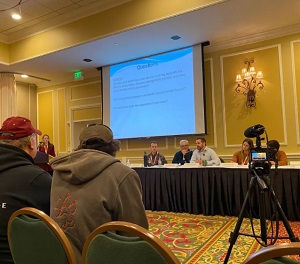
Massive study examines offshore wind’s impact on fishing, fisheries
A just released “first of its kind” report that federal regulators and the fishing industry spent three years working on is making the rounds, exploring the impacts of offshore wind on fisheries and commercial fishermen, and identifying the questions that remain unanswered. They just released their results in a nearly 400-page “Synthesis of Science” report — a collaborative effort between the Bureau of Ocean Energy Management (BOEM), the lead regulator of offshore wind; NOAA’s Northeast Fisheries Science Center; and the Responsible Offshore Development Alliance (RODA), a membership-based coalition of the fishing industry. >click to read< 09:31
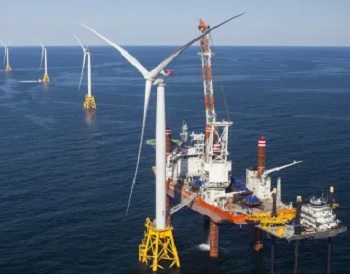
4 lawsuits threaten Vineyard Wind
The lawsuits against America’s first major offshore wind project are coming to a head. Four cases are challenging the federal environmental permit issued to Vineyard Wind, a 62-turbine facility being planned for construction in the waters off Martha’s Vineyard. A federal judge in Massachusetts heard arguments brought by landowners in two cases in recent weeks. The other two suits, brought by fishing groups, have been consolidated and will appear before the same judge for oral arguments in Boston on Monday. The cases against Vineyard Wind allege that the Bureau of Ocean Energy Management conducted an inadequate environmental review when it approved the project by failing to account for its impact on everything from fishermen to the critically endangered North American right whale. >click to read< 07:32
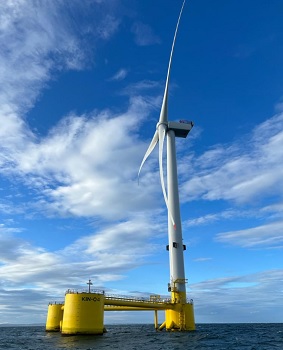
Panel discusses impact of offshore wind on West Coast fisheries
The Biden administration has called for deploying 30 gigawatts of offshore wind energy to combat climate change by 2030. Depending on where the turbines are placed, they could displace highly productive fishing grounds that account for billions of dollars and thousands of jobs in Oregon, Washington and California. Projects must be planned carefully using the best available science to mitigate potential damage, according to a panel of experts who spoke March 1 at the Northwest Offshore Wind Conference in downtown Portland. >click to read< 11:52

Few assurances for fishermen in federal offshore wind approval
Offshore wind developers have assured the commercial fishing industry all along that the thousands of massive turbines that they want to install in the ocean up and down the East Coast won’t block fishermen from waters where they make their living. But the final approval issued this week for Vineyard Wind 1, the nation’s first major offshore wind farm, offers few guarantees to commercial fishermen. Take for instance this passage from the Army Corps of Engineers in the Record of Decision for the 62-turbine project that would be built off the coast of Rhode Island and Massachusetts: “While Vineyard Wind is not authorized to prevent free access to the entire wind development area, due to the placement of the turbines it is likely that the entire 75,614 acre area will be abandoned by commercial fisheries due to difficulties with navigation.” >click to read< 16: 36

‘Tragedy of the Commons’ Will be the Fate of Marine Environment in Atlantic Offshore Wind Farms
Like the English commons, the Atlantic waters could take just so much ‘grazing’. The Canadian government finally recognized the cod fishery had crashed and closed it;,, Recognizing that fish could not be owned until they were caught, government regulators attempted to at least partially privatize fishing rights. So too, the waters in which they swim (Hague Line dividing CN and US waters in the Gulf of Maine and on Georges Bank.) It was that bottom and those waters that wind farm builders wanted “rights”.,,, So, the question arises “why don’t the fishing interests move to protect these sensitive marine habitats?” They have tried without much success. >click to read< 18:43
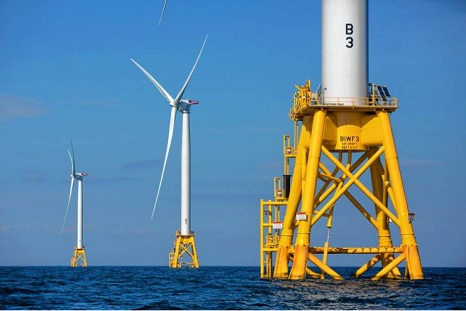
As Commerce Secretary, Raimondo to play key role in offshore wind.
In the selection of Gina Raimondo as the next U.S. Secretary of Commerce, the offshore wind industry would get a champion in Washington. What influence she could bring to bear for the emerging energy sector remains to be seen, but if confirmed to her new position in the Biden cabinet, Raimondo would oversee federal fisheries regulators who have raised some of the concerns about potential negative impacts of erecting what could be many hundreds of wind turbines in the ocean waters off southern New England. >click to read<09:45
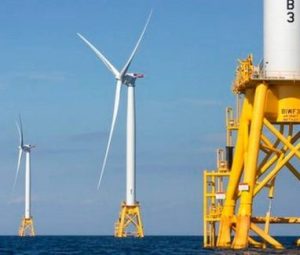
Renewables and unions: Biden rounds out energy Cabinet
President-elect Joe Biden closed out his Cabinet picks last week with the choice of Rhode Island Gov. Gina Raimondo (D) for Commerce secretary and Boston Mayor Marty Walsh for Labor secretary,,, Offshore wind insiders say Raimondo appears to be an answer to the growing friction between a burgeoning renewable sector and the fishermen who have long been the ocean’s dominant users.,, Raimondo would oversee NOAA Fisheries, a critical gatekeeper to the growing line of offshore wind projects awaiting approval from the incoming Biden government. >click to read< 17:08
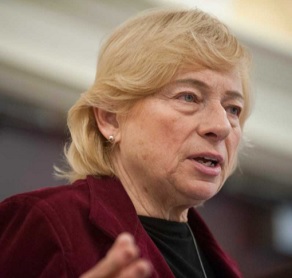
Gulf of Maine: Fishermen Worry About Rapid Pace Of Wind Development
In late November, the Mills administration announced that the state would seek a federal lease for up to 12 floating wind turbines off southern Maine that could produce enough energy for more than 70,000 homes. “We think there’s a real opportunity for Maine to be a leader in the country on floating offshore wind,” says Dan Burgess, (you’re full of crap, kid!) who leads the governor’s energy office. But if Gov. Mills wants to be in the driver’s seat, fishermen say she should take her foot off the gas, and step on the brakes. >click to read< 07:45
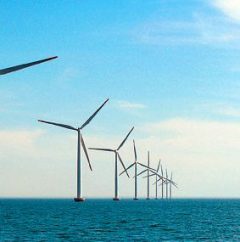
Here comes that “tracking your activity science”! URI researcher to map commercial fishing activity to help reduce conflict between fishing, wind industries
“I’m exploring a new way of improving spatial planning for offshore wind,” said URI Associate Professor Thomas Sproul. “One of the biggest sources of delay in the regulatory process for offshore wind has been because of the conflicts with commercial fishing.” Sproul said. Partners include the Massachusetts Fishermen’s Partnership, the Commercial Fisheries Research Foundation, the Responsible Offshore Development Alliance, and the Commercial Fisheries Center of Rhode Island. Julia Livermore, a supervising marine biologist for the Rhode Island Department of Environmental Management, is also collaborating on the project. >click to read< 09:30

Fishing groups wary of rapid offshore wind development plans
As offshore wind moves up the coast of New England, efforts are underway to make sure the region’s fishing interests have a seat at the table early in project development. An alliance of industry and academic stakeholders is promoting the need for research and best practices as offshore wind takes hold in waters where fishing has long been an economic anchor. Fishing groups have several concerns about the potential for boating obstacles and ecological impacts. A dearth of research makes the industry hesitant as it prepares for a slew of projects that could overwhelm their operations. Above all, fishing stakeholders want to be included from the start of wind project development. >click to read< 09:07

Jones Act changes would ‘jeopardise countless US jobs’ in offshore wind
US fisheries advocacy body the Fisheries Survival Fund (FSF) has claimed proposed changes to the Jones Act – requiring that cargo, including wind turbines, shipped between US ports be transported on American-flagged vessels – could cost ‘countless of job opportunities’ to local companies in the rapidly emerging Northeast Atlantic offshore wind sector. “These proposed modifications would place foreign-owned offshore wind energy companies at a unique advantage not afforded to the thousands of US-owned maritime industries, including commercial fisheries,” said FSF counsel David Frulla. “FSF is not submitting this letter to oppose offshore wind energy development in its entirety,, >click to read< 09:21

Stonington fishermen say windfarm developer not responding to their concerns
Joe Gilbert, who has a fleet of four commercial boats based at the Stonington Town Dock, said he met with John O’Keefe, head of marine operations for Ørsted, in March to discuss the “vast” concerns that he and other fishermen have ranging from potential environmental impacts to spacing in between turbines. The meeting, which lasted several hours, was productive with O’Keefe taking copious notes, Gilbert said. “I thought it was the beginning of an open dialogue between the wind developer and the fishermen,”,, Gilbert said he never heard back from O’Keefe about how Ørsted plans to address the issues, even after following up multiple times with him and other company officials. Eventually, he and a group of Stonington fishermen were offered a meeting,,, >click to read< 21:05

EnBW North America hires fisheries liaison
EnBW North America has appointed Beth Casoni as the company’s fisheries liaison and has joined the Responsible Offshore Development Alliance’s (RODA) joint industry task force devoted to address issues of mutual interest to commercial fisheries and offshore wind. The company said its immediate attention is on the New York Bight – an area off the coasts of New York and New Jersey, where the federal Bureau of Offshore Energy Management is expected to auction wind lease areas in late 2020. >click to read< 11:22
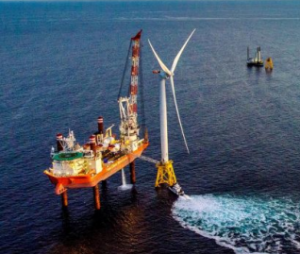
In Northeast, more research needed on offshore wind’s impact on fishing
As plans for wind farms across New England’s waters progress, fishermen continue to express concerns about the impact of the burgeoning offshore wind industry on their livelihoods. And while wind development is moving rapidly, (into your old fishing grounds) scientific research on the impacts on fisheries has struggled to keep up. But the tides may soon be turning, thanks to the collaborative efforts of the fishing industry, offshore wind developers, and government agencies. Last week, the Responsible Offshore Development Alliance announced a new initiative to advance regional research on fisheries and offshore wind called the Responsible Offshore Science Alliance. >click to read<15:52

NOAA, BOEM, Fishing Industry Sign New Memorandum of Understanding
NOAA Fisheries, the Bureau of Ocean Energy Management (BOEM), and the Responsible Offshore Development Alliance (RODA) signed a 10-year Memorandum of Understanding that brings local and regional fishing interests together with federal regulators to collaborate on the science and process of offshore wind energy development on the Atlantic Outer Continental Shelf. >click to read<12:52
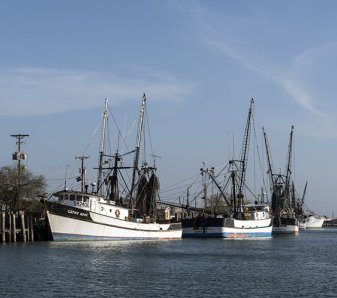
Responsible Offshore Development Alliance forms on the East Coast
With offshore renewable and wind energy development becoming increasingly common on the East Coast, a new alliance has formed to ensure that these developments are compatible with the existing interests of the nation’s fishing communities. The Responsible Offshore Development Alliance (RODA) brings together a broad range of commercial fishermen from across the Northeast and Mid-Atlantic to advocate for their shared concerns over emerging offshore developments. >click to read<17:24






